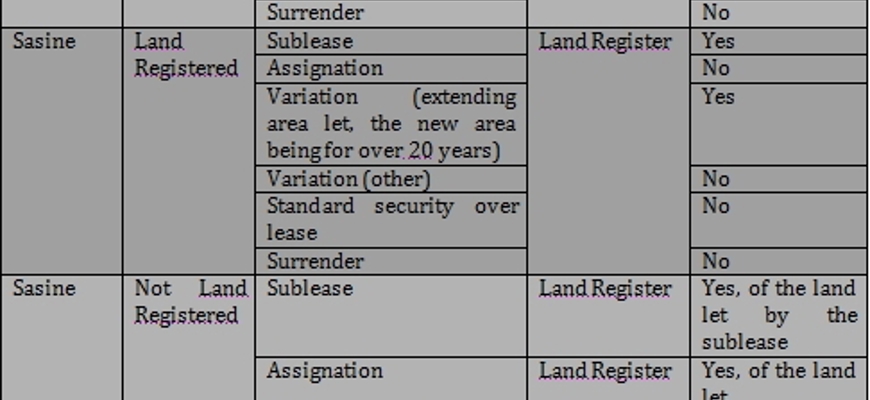Land registration and leases

What is automatic plot registration?
A long lease is one granted for longer than 20 years’ duration (i.e. at least 20 years and a day). The definition also includes a lease of a shorter period, if it includes an obligation on the landlord to renew so that the entire period could equate to longer than 20 years at the tenant’s option. Tacit relocation is not such an obligation, because that is in both parties’ control rather than being an obligation in the lease as such.
As under the 1979 Act, long leases require to be registered in order for the rights under the lease to be made real, regardless of where the underlying title is registered.
Where however the heritable title over which the long lease has been granted is not registered in the Land Register, this will now trigger registration of the underlying land itself, in a process called automatic plot registration, or APR. In APR, the underlying land will be registered with no registration dues cost payable for that element.
Under the 2012 Act there are now two questions that must be considered with all new long leases and dealings with existing long leases: first, whether the transaction is registrable under the new regime; and secondly, whether it will trigger APR.
The table below sets out the position for dealings with existing long leases.
If a registered lease has come to an end it can be removed from the register in one of two ways. First, where the lease is terminated by a deed (such as a deed of renunciation) then that deed can be registered. Secondly, where the lease has been terminated other than by a deed, it may be removed by rectification provided suitable evidence of termination is supplied to Registers of Scotland (“RoS”).
Land to be registered under APR
What will be the registered extent?
It is only the property actually let or dealt with that APR applies to. This would include areas, such as car parks within shopping centres, where they are included within the extent of the lease even if only to a pro indiviso extent. Other parts of the landlord’s title over which the tenant has ancillary rights, such as accesses, cannot be registered under APR.
Patchwork registered titles are not ideal for a number of reasons, so the landlord may wish to voluntarily register the rest of their title by submitting a separate application form. Ideally both forms would cross refer to each other so that RoS can make up one title sheet for the whole title, if both applications are acceptable. Neither application would be dependent on the other.
What are pros and cons voluntarily registering the landlord’s title where this is in excess of the subjects affected by APR?
Pros:
- The title investigation for the whole will already have been carried out, thus avoiding duplication of work.
- It is sometimes easier to provide details of all servitudes and encumbrances than to specify which affect part only of a title.
- Future dealings are generally easier where there is one title sheet of an entire title, instead of one or more relating to part.
Cons:
- Registration dues are charged for voluntary registration (APR is free).
- There may be other ancillary costs such as mapping the larger area, and of course solicitors’ fees.
How should I deal with tenement buildings?
For all first registrations of land, any encumbrances must be flagged up to RoS. See “Questions of form”, Journal, September 2015, 18.
A long lease is an encumbrance even if it predates land registration. Therefore if a landlord has several units let to different tenants, any leases that affect the plot being registered must be mentioned as encumbrances.
This means that, for the APR, any long leases of properties vertically above or below the area being dealt with (i.e. affecting the same underlying plot of ground) must be flagged up.
How should I deal with ultra-long leases?
The Long Leases (Scotland) Act 2012 will come into force on 28 November 2015. From that date, certain ultra-long leases will be automatically converted into outright ownership. This will of course have to be taken into account in any title examination, since such leases would no longer be encumbrances on the once landlord’s title, but rather titles in themselves.
Landlord approval of APR
If I and my landlord client do not become involved in the APR, is that safer in terms of our liabilities under the 2012 Act?
The landlord (as granter), the tenant (as applicant) and both solicitors have a statutory duty of reasonable care not to make the register inaccurate. If the landlord is granting the lease or other deed being registered, they should be involved in the registration process.
In practice this means the landlord should at least approve the tenant’s registration application form, since it will ultimately result in the landlord’s registered title. See “Application forms: should the seller adjust?” (Journal, May 2015, 10). The landlord should also advise the tenant of any unwritten servitudes benefiting the property, if the landlord wants these noted on the title sheet (see “Questions of form”, above).
If acting for the tenant, how should I seek the approval of the landlord to the APR?
It is in both parties’ interests that a collegiate approach is taken. A landlord will not want to run the risk of losing rights by personal bar or otherwise, or of potentially contributing to loss of other tenants’ or third party rights. The tenant will want to sign as clear an application form as possible to minimise the risk of rejection, but may find this tricky if the landlord is not involved as the form will lead to the landlord’s title sheet being issued too. Of course the tenant’s risk decreases if the landlord answered appropriate enquiries at the due diligence stage, as to unwritten rights and so on. Normally therefore it will be the landlord who will need to make sure their missives protect them. For example they may want clauses to cover approval by the landlord of the application form; an obligation on the tenant not to change the application materially without the landlord’s approval; and for both parties to assist each other with rejections etc.
It may be that the landlord is not directly involved in the transaction, such as where landlord’s consent is not needed to an assignation or sublease.
In that scenario, the parties will have to agree whether to approach the landlord, assuming of course they know the landlord's identity. Such an approach should be simply an offer to allow the landlord to approve the registration application, not the deal itself: the landlord should not be led into thinking that completion is contingent on their response. Even if they decide not to assist or respond, the parties will have tried, and as such they should not have to qualify the land registration application form.
If they do not approach the landlord – whether for fear of rocking the boat or because they cannot identify them – it would be wise to disclose that on the application form. A mere disclosure will not necessarily lead to rejection. Indeed since there are two title sheets produced, the tenant could obtain full warranty while the landlord may be given restricted or no warranty. Provided there are no registered ownership overlaps, and the assignation or sublease is valid on the face of it, an actual rejection should be unlikely.
Table
In this issue
- Land registration and leases
- Disharmony and disharmonising
- FCA reviews: not the end of the story?
- A host of claims for guests
- Pensions auto-enrolment: some clarity for trainees
- Reading for pleasure
- Opinion: Stewart Cunningham and Nadine Stott
- Book reviews
- Profile
- President's column
- KIR: have your say
- People on the move
- You and whose mind?
- Deil tak the hindmost
- Cultivating judgment
- Women: paths to power
- Sorry: no longer the hardest word?
- Fairness in the balance
- Minimum pricing: the latest
- Planning: shakeup on the way?
- New burdens for employers?
- Scottish Solicitors Discipline Tribunal
- Ancillary rights as real rights
- Life at the cutting edge
- One form if firms hold client money
- Further fraud alerts issued
- Law reform roundup
- Guidance: duties re legal rights
- From the Brussels office
- Rights in chaos: asylum seekers and migrants in the EU
- Mirror wills: can I change?
- Renewal: the impetus for review
- Ask Ash
- The day of minimis is here
- If it ain't broken...?
- The voice of youth






